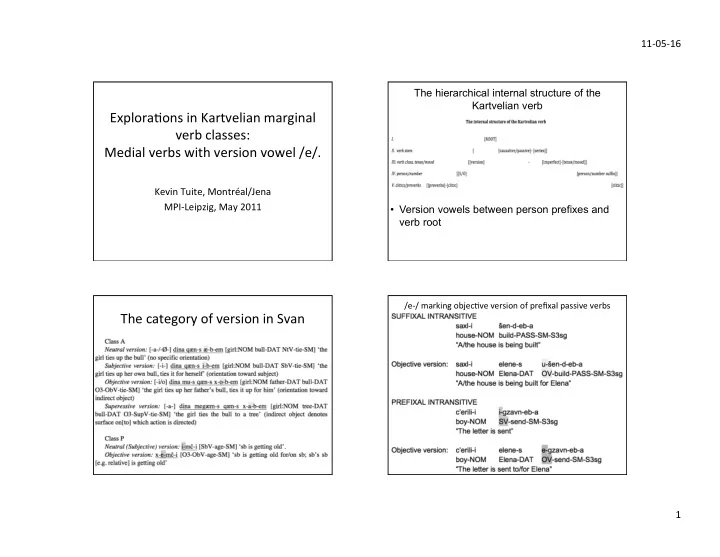

11‐05‐16 The hierarchical internal structure of the Kartvelian verb Explora.ons in Kartvelian marginal verb classes: Medial verbs with version vowel /e/. Kevin Tuite, Montréal/Jena MPI‐Leipzig, May 2011 • Version vowels between person prefixes and verb root /e‐/ marking objec.ve version of prefixal passive verbs The category of version in Svan 1
11‐05‐16 Formally passive verbs in /e/‐version Problema.c distribu.on of the /e/ prefix • Func.ons 1‐3 in other Kartvelian languages; remainder largely limited to Georgian • In all Kartvelian languages, however, /e/‐prefix aUested with a small number of non‐passive verbs /e/ prefix in medial verbs Examples of /e/‐version medials These /e/‐medials lack the stem formants and person suffixes that mark passive verbs. In terms of their morphology, they resemble ac.ve verbs rather than passives. 2
11‐05‐16 The /e/‐prefix in mi=v‐e‐c “I gave it to sb” /e/ from umlauted version vowel /a/ ? as a red herring? • Problem: (a) transi.ve verb with /e/ ( mi=v‐e‐c ) limited to Georgian; (b) all other anomalous /e/‐verbs are intransi.ve atelic medials that usually do not appear in aorist‐series • Evidence from Svan as well as Old Georgian of mobile paradigms stress in past‐indica.ve verb forms: stem or prefixal accent • Kavtaradze (1954: 309) took it at face value as evidence in 1 st & 2 nd person, suffixal accent in 3 rd ‐person of /e/‐version with transi.ve ac.ve verbs • Old Georgian imperfect paradigms show stress‐ • Shanidze (1976: 550‐1) wondered if the /e/ could have condi.oned vowel syncope, as well as /a/ > /e/ umlaut originally been part of the root: /c/ < */hec/ condi.oned by suffixal /i/. • No trace of /e/ version (nor of any root vowel) in Laz & • Elimina.ng the highly atypical case of Geo /‐c‐/ reveals the Mingrelian cognates of Geo /c/. numerous commonali.es among the remaining examples of anomalous /e/‐version. (a) Almost all /e/‐version medials paired with /i/‐version (b) Seman.c features of /e/‐version medial verbs • Atelic (ac.vity verbs). Mostly used in present and imperfect tenses; seldom or never in aorist series of tenses (punc.lear aspect) • Seman.c prototype: “mourn, keen”, represented in Geo (2x), Svan (2x), Laz & Mingrelian (albeit by non‐cognate roots). • Common to all Kartv. Languages: socially‐situated asymmetric vocal/speech acts (mourn, mock, chat, pray …). • Second argument (a) animate, usually human; (b) entailed by ac.on, but can be backgrounded; (c) role compara.vely passive (object of mourning, mocking, seeking, etc.). • For most mono‐/bi‐valent pairs, the /i/‐version counterpart seems unmarked compared to /e/‐version. (Excep.ons: Old Geo. /e‐sav‐s/ “trusts in”, /e‐k’icxev‐s/ “mocks”) 3
11‐05‐16 /e/ version in Kartvelian e/i‐medials and the morphology of middle voice • 1. /e/‐version almost always paired with /i/ • Kemmer (1993) iden.fied “situa.on types” • 2. /e/‐version limited to intransi.ve verbs associated with middle voice in 30‐language sample (passive & medial) • Kartvelian: no single morphological marker of • 3. (probably small) class of medials with /i/ middle, covering full range of situa.on types and /e/ version prefixes can be aUributed to Proto‐Kartvelian, the seman.c range of which • (1) Verb types with version /i/ and/or /e/: e/i‐ included certain types of socially‐situated medial, deponent, subjec.ve‐version transi.ve, asymmetric vocal/speech ac.vi.es. indirect passive; • (2) Other verb types: root intransi.ve, medioac.ve, indirect mediopassive Kemmer’s “situa.on types” for middle verbs Evolu.on of e/i‐medials • Georgian: i/e‐medials remain marginal group among medioac.ves (half‐dozen) • Svan: paired i/e‐medials deno.ng wider range of interac.onal and rela.onal ac.vi.es (chat, serve, be disciple of, ask, steal from); extension of /e/ version to ablau.ng (root) intransi.ves ( x‐e‐t’x‐en‐i “returns to sb” vs. x‐o‐t’x‐en‐i “sb’s sthg returns”) • Mingrelian: /e/‐medials marginal. Produc.ve type of /i/‐medial with suffixes –in‐an‐, deno.ng person’s expression while looking/staring (e.g. i‐dɣvidɣv‐in‐ an‐s “glowers, looks menacingly”). These correspond to one class of deponent verbs in Georgian 4
11‐05‐16 /i/‐prefixed intransi.ves: passive and “deponent” uses i/e‐prefixed medials and passives • /i/‐prefixed intransi.ves are primarily passives of transi.ves formed from same root (e.g. Geo. c’er‐s “writes”, i‐c’er‐eb‐a “is being wriUen”. • The prototypical meaning of i/e‐prefixed • In all Kartvelian languages, certain /i/‐ (also /e/)‐prefixed medials is very close to that of i/e‐prefixed intransi.ves have “deponent” readings. The agent is passives when used as “deponents”: foregrounded, rather than backgrounded. • 1. Socially‐situated, aUen.on‐geong ac.vity. • Kartvelian deponents typically denote repeated, habitual • 2. Foregrounding of agent rather than ac.vi.es, especially when characteris.c of the subject, or recipient or addressee. conspicuous for their appearance or (in)appropriateness, e.g. i‐c’er‐eb‐a “writes [leUers, news] regularly”; i‐landzɣ‐ • 3. Atelic, dura.ve aspect eb‐a “curses, is [habitually] foul‐mouthed”. • Deponent (an.)passives found in all Kartvelian languages (especially numerous in Georgian and Svan). AUested in earliest periods of Georgian literature. Implica.ons for the reconstruc.on of version category in Kartvelian • i/e‐version prefixes associated with intransi.ve verbs, medials as well as passives • Although i/e‐version medials such as i‐glov‐s /e‐glov‐s and “deponents” are compara.vely marginal verb classes in the modern Kartvelian languages, the evidence points to their long history in this family. 5
Recommend
More recommend